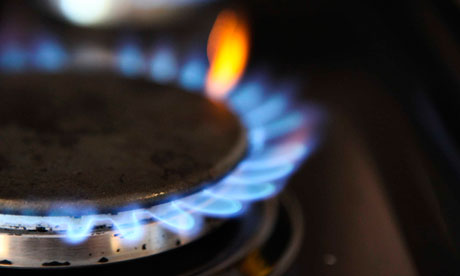It is where energy, climate change and bare-knuckle street politics collide: soaring household electricity and gas bills. And so it’s no surprise that prime minister David Cameron has been taking a keen interest and received a briefing from his new, ex-BP, adviser Ben Moxham.
It was leaked today, allowing the Daily Telegraph to strike the latest blow in the right-wing press’s campaign against green energy policies: “Environment policy reforms to add £300 to energy bills”.

Let’s take that head on. A source in Westminster tells me that Moxham was clearly referring to electricity alone when he suggested a 30% rise by 2020, meaning the rise would be about £135, but that the sentence was sloppily written. The source says Moxham’s analysis is “very sensible” and not vastly different to that at Chris Huhne’s department of energy and climate change. The official response from Decc is the same: “Reforms will not add £300 to bills.”
Moxham says Decc’s projections on how many people will take up “Green Deal” energy efficiency measures to cut bills, such as lagging lofts and filling cavity walls, are “unconvincing”. So, does Moxham think this green zealotry should be abandoned?
Far from it. “We believe a large number of measures will need to be subsidised, given the hassle factor and other barriers to consumer uptake,” writes Moxham, agreeing with others who have criticised the Green Deal for not being ambitious enough.
As ever, the key to energy is cost, carbon and keeping the lights on. The unavoidable fact is that much of UK’s coal and nuclear electricity generation capacity is due to close, so new capacity has to be built. Consumers will pay for that, thanks to lack of past investment by the UK’s unusually liberal energy market. The UK is also legally bound to reduce carbon dioxide emissions, as its contribution to tackling global warming.
So that leaves cost. If you think that gas, oil and coal prices – including future international carbon taxes – are likely to rise moderately, then investing in renewable energy would be more costly. If you think prices will rise – and they already are – then green energy is the better bet. Huhne argues that if oil is over $100 a barrel in 2020, his green energy policies will mean lower bills. I know where I’d place my wager.
Renewables also have the very great benefit of not being dependent on imports from foreign countries. That future-proofing is surely worth a lot.
So instead of Canute-like railing against green energy that is in the long-term the only secure and sustainable source of power, why don’t critics tackle other pressing issues that also bear on costs. One target should be the monopoly which the UK’s big six power companies operate: they have 99% of the nation’s customers. How much will that concentration of power increase future bills?
 Follow
Follow